|
Buddhist monasticism is flexible. Although it is correct to assume that it is usually necessary for an individual to undergo a period of isolatory training (to establish and stabilise the realisation of the void) - it is also true that compassionate (Bodhisattva) activity must also be pursued throughout the myriad conditions that define worldly existence. This is true of all Buddhist traditions - as even the Bhikkhus of the Theravada School must "walk" (in a self-aware manner) through the surrounding (lay) villages - begging for food on a daily basis. Living a hermitic or cloistered existence is a means to an end and not an end in itself. Of course, this period may be repeated more than once and last any length of time. When entering different situations - the Bodhisattva does not lose sight of the realised void regardless of the external conditions experienced. The Sixth Patriarch (Hui Neng) spent around 15 years living with bandits and barbarians in the hills - retaining a vegetarian diet - even though he was not yet formally ordained in the Sangha. Within China, the Mahayana Bhikshu must take the hundreds of Vinaya Discipline Vows as well as the parallel Bodhisattva Vows (the former requires complete celibacy whilst the latter requires moral discipline but not celibacy). Anyone can be a "Bodhisattva" - whilst a formal Buddhist monastic must adhere to the discipline of the Vinaya Discipline. A lay Buddhist person also adheres to the Vinaya Discipline - but only upholds the first Five, Eight or Ten vows, etc. Vimalakirti is an example of an Enlightened Layperson whose wisdom was complete and superior to those who were still wrapped in robes and sat at the foot of a tree. In the Mahasiddhi stories preserved within the Tanrayana tradition - the realisation of the empty mind ground (or all-embracing void) renders the dichotomy between "ordained" and "laity" redundant. The Chinese-language Vinaya Discipline contains a clause which allows, under certain conditions, for an individual to self-perform an "Emergency" ordination. This is the case if the individual lives in isolation and has no access to the ordained Sangha or any other Buddhist Masters, etc. The idea is that should such expertise become available - then the ordination should be made official. However, the Vinaya Disciple in China states that a member of the ordained Sangha is defined in two-ways: 1) An individual who has taken both the Vinaya and Bodhisattva Vows - and has successfully completed all the required training therein. 2) Anyone who has realised "emptiness". Of course, in China all Buddhists - whether lay or ordained - are members of the (general) Sangha. The (general) Sangha, however, is led by the "ordained" Sangha. As lay-people (men, women, and children) can realise "emptiness" (enlightenment) - such an acommplished individual transitions (regardless of circustance) into the "ordained" Sangha. This is true even if such a person has never taken the Vinaya or Bodhisattva Vows - regardless of their lifestyle or position within society. Such an individual can be given a special permission to wear a robe in their daily lives - but these individuals do not have to agree with this. Realising "emptiness" is the key to this transformative process. Emptiness can be realised during seated meditation, during physical labour (or exercise), or during an enlightened dialogue with a Master. The first level is the "emptiness" realised when the mind is first "stilled". This "emptiness" is limited to just the interior of the head - but the ridge-pole of habitual ignorance has been permanently broken (this is the enlightenment of the Hinayana) - and is accompanied by a sense of tranquillity and bliss. This situstion (sat atop the hundred-foot pole) must be left behind. Through further training, the "bottom drops out the barrel" - and the perception of the mind expands throughout the ten directions. Emptiness embraces the mind, body, the surrounding environment - and all things within it.
0 Comments
Dear B It is interesting that those who were illiterate - such as Hui Neng - could have the essence of mind development conveyed to them by simply studying the "shape" (form) of the Trigrams and Hexagrams. Of course, Master Cao develops this idea through his shaded roundels. Indeed, it could well be that the roundels of the Caodong School eventually led to the development of the Taiji Tu [太極圖] (Yin-Yang Symbol) that was developed during the latter Song Dynasty. Either way - the "beyond words" teaching - may have had its root in illiteracy - as the historical Buddha could not read or write - as astonishing as that seems!
Dear Tony Richard Hunn (1949-2006) was both my academic and spiritual teacher. He taught me how read, write and interpret traditional Chinese ideograms. I trained with him between 1989-2006. He was an English gentleman who could read, write and speak many dialects of the Chinese language - including the rare Hakka dialect spoken by our Chinese grandmother (whom Richard met in 2000 during a visit to our house). I wrote this for Richard following his passing: He helped me understand and balance the two sides to my character - the 'Chinese' and the 'British'. He used to work for Pebble Mill (BBC) - but was an academic expert on the Chinese language and Chinese Buddhism. His spiritual teacher was Charles Luk (1898-1978) - who in-turn trained under the Great Chinese Ch'an Master Xu Yun (1840-1959). To me, Richard Hunn represented everything that is great and good about the UK. In 1991, Richard Hunn gave-up his life in the UK and migrated (via a modest academic study grant) to Kyoto in Japan. He lived there between 1991-2006 (marrying a Japanese woman - Taeko - with whom I am still in communication with today). Why did he choose Japan? Well, he received an academic grant to study the transmission of Chinese Ch'an from China to Japan - which included examining the Chinese Ch'an Temples that still exist in Japan - separate and distinct from the Japanese 'Zen' Temples. Every August-September each year, Richard Hunn (who worked at Kyoto University) used to escort a number of his English Study students (usually 20 or so) to look around London. The students would stay for about two-weeks before returning as a group to Japan without Richard. Being 'free' of this responsibility, Richard would visit all his family - before spending a week or two at our house in Sutton (Priory Road - where you showed me an excellent Tensho Kata in the hall). We would meditate together and discuss reality deep into the night. He used to test my understanding of Chinese ideograms - crushing my stupidity and encouraging my insight. Even so, I was reticent to actually 'translate' anything - until a number of Mainland Chinese students studying in the UK checked my work - and encouraged me to start translating. I was then put in contact with a number of academics in China and my life entered a new phase. Richard Hunn visited a number of old martial arts 'Dojo' positioned in and around the remote Kyoto hills. He was often 'Introduced' with a letter to various Old Masters who lived in rustic huts - usually with only one or two disciples. Many practiced Chinese arts unaltered in anyway for hundreds of years. These Japanese men and women also studied traditional Chinese ideograms - the original language of the arts they preserved. As these arts existed 'outside' the grading (coloured-belt) system of Japan - they were excluded from all State financial support - hence their simplistic existence. Best Wishes Adrian
Dear B Douglas Harding used to hold Zen meditation sessions by lying on the floor. He had no time for formal structure - as 'having no head' also apparently meant that 'he had no body' - although most people who encounter his work seem not to realise the latter. Richard Hunn knew John Blofeld and Douglas Harding - although if he knew Terrence Grey - nothing was said to me. Blofeld mentions meeting Xu Yun - but Xu Yun does not mention meeting Blofeld. This need not negate the encounter - as Xu Yun was photographed with numerous Westerners - many of whom are not mentioned in his biography. In the UK - the barbarous treatment meted-out by the Imperial Japanese Army to British POWs and civilians is still remembered with disgust and derision - as is their savage treatment toward tens of millions of Asian victims. Just what Blofeld is talking about does not ring true. Richard told me that Blofeld eventually retired to Thailand - and 'gave-up' Buddhism in the last years of his life - becoming anti-Asian and pro-Christian, so perhaps his wayward attitudes express these changes. I inherited Charles Luk's papers, and having looked through the volumes, I can say that there is no mention of John Blofeld, Douglas Harding or Terrence Grey. Charles Luk was opposed to Japanese religious corruption and actively campaigned against it. He certainly would not have assisted Blofeld if he knew of his pro-Japanese attitudes. As to hilly Hong Kong mountains - he is probably speaking of the Sai Kung area of the New Territories - where our Ancestrial village used to be. As the area is now a 'National Park' - the US social media has extended the so-called '411' mythology to include this area. Whenever I visited the area - I used to make sure I was with Chinese relatives who knew where they were going. Yes - Richard Hunn gave me his copy of John Blofeld's Yijing. It is a peperback to which Richard added a stouter cover. Of course, it is not the full Yijing, but only the Hexagrams, its line commentaries, the Judgements and Images. From what I can see, I believe Blofeld is copying Wilhelm and is not working from the original Chinese language text. It is a re-interpretation of a translation. Of course, I suspect there are hundreds of these re-interprtations in the English language by now - and that a certain selection can grant an overview of the original text. I am told that an astonishing 600,000 Americans go missing each year in well sign-posted National Parks and National Forests - although all but 6,000 are found safe and well - and that this finding is through the application of the scientific method. When people's lives are at stake I doubt superstition can replace logic and reason. In the days that Blofeld is referring to - the New Territories were strewn with hundreds of villages - many of them Hakka (he does not know this because he never went there). The distance between villages was quite often miniscule. I would say that getting truly lost would have been very difficult as there were settlements everywhere. These are the settlements the Imperial Japanese Army raped and pillaged their way through - killing at least 10,000 people in a relatively small area (1941-1945). The Yijing certainly did not assist the ethnic Chinese escape this fate. One last point that Blofeld is missing is that the Imperial Japanese Government 'banned' everything 'Chinese' - and this included the study of the Yijing. Blofeld is, therefore, misinformed and I would say, not to be trusted. With Metta Adrian
Richard Hunn (Wen Shu) was NOT keen on any notion of ‘Transmitting’ the Ch’an Dharma. This coincided with his attitude of NOT wanting to be associated with any particular University, Publisher or Dharma Group, etc. I agree with this approach. Dogma, idealism and superstition has nothing to do with genuine Chinese Ch’an Buddhist practice. What an individual does with their mind (and body) regarding attitudes and opinions held concerning life, politics, culture or everyday activities – has absolutely NO interest for the genuine Chinese Ch’an Master! This attitude is encountered time and again throughout the Tang, Song, Yuan, Ming and Qing Dynasties Ch’an writings of Imperial China – with Master Xu Yun (1840-1959) carrying-on this attitude into the post-1911 era of ‘modern’ China! Obviously, I have NOTHING to transmit. Teaching is simply taking the conditions that already exist – and turning the awareness of the enquirer back toward the ‘empty mind ground’ from which all perception arises (and ‘returns’ according to the Chinese Ch’an tradition) - this is a ‘transmission’ in a general sense – but such an interaction cannot be interpreted as an individual in the West being granted ‘Transmission’. Within Chinese culture, such ‘Transmission’ was Confucian in origin and often travelled within birth families and specific name clans – very seldom (if ever) was a ‘Transmission’ initiated ‘outside’ the family (as ‘outsiders’ could not be trusted to use the family secrets of spirituality, science and martial arts properly). Later, when the ‘Transmissions’ of (related) ‘Father to Son’ was adjusted to accommodate (non-related) ‘Masters to Disciples’ - outside ‘Transmissions’ (separate from the Confucian birth-process) was developed. This is the agency of continuation from generation to generation preserved within the Chinese Ch’an tradition. Birth-relationship is replaced with a ‘strict’ attitude of ‘respect’ and the maintaining of ‘good’, ‘correct’ and ‘appropriate’ decorum, behaviour and deportment. Even within ‘modern’ China – this is a difficult interaction to a) perform and b) achieve. The standards for keeping the mind and body permanently ‘clean’ night and day and is often viewed as being far too difficult for the average individual to meet. As ‘Transmission’ is NOT a game and given that ‘Transmission’ within the Chinese Ch’an tradition is NOT the same as ‘Transmission’ within the Japanese Zen tradition – it is obvious that when the Chinese Ch’an tradition ‘flows’ into the West – it is NOT the case that ‘Transmission’ can easily be applied. The empty mind ground must be ‘realised’ (not an easy task) and ‘maintained’ in every situation (an even more unlikely achievement). I have experimented with ‘Transmission’ in the West – but have found that as soon as the event unfolds – an IMMEDIATE ‘dropping away’ of all interactive effort, respect and continuation occurs. This means that the crucial and inherent energy is diminished, sullied and obscured - and the Ch’an lineage loses its clarity, understanding and ability to ‘free’ others. This explains ‘why’ I have eventually WITHDRAWN all so-called ‘Transmissions’ as a means to emphasis the recorded activities of the Chinese Ch’an Masters – written down in China and translated into English by Charles Luk [Lu Kuan Yu] (1898-1978). Granting Chinese language Dharma-Names and formally ‘Welcoming’ individuals into the ‘Lineage’ - does NOT constitute a ‘Transmission’. As helping others is a key element of the Bodhisattva Vow – I do NOT wish to inadvertently ‘damage’ the Chinese Ch’an tradition entrusted to me – by generating what amounts to a ‘dysfunction’ of transmission.
Dear J
Thank you for your interesting email. Richard Hunn spent much of his mature years working upon a full Chinese-English translation of the Yijing whilst working with a British publisher at a time when such an idea was unheard of in the West. The problem was that this publisher wanted to change many aspects of the translation and Richard Hunn disagreed - as these changes would alter the intended meaning of the translation. Due to these creatiive difference - the Publisher eventually pulled the plug and the project was shelved (in the late 1980s). Nowadays, translations like this are fairly common in the West (many produced by ethnic Chinese scholars) - so perhaps Richard Hunn was ahead of his time! As well as studying the available Richard Wilhelm translation (in its various guises) - Richard Hunn thought highly of the concise (English) translation generated by John Blofeld (not very well-known today). Although Richard Hunn would spend much of his time reading the original Chinese language version of the Yijing presented to him by Charles Luk (1898-1978). John Blofeld translation is only the 64 Hexagrams and the directly related commentary material (together with the 'line' commentaries) excluding the Ten Wings content. This is similar in structure to the various 'Pocket' or 'Concise' editions of Wilhelm (premised upon the 1950 edition translated by Cary F. Baynes from the German into the English language). John Blofeld's rendering of the Yijing, however, is a very different English language translation than that generated by Wilhelm-Baynes (Richard Hunn personally knew John Blofeld - despite Richard being much younger than John). John Blofeld ended his days living in Thailand (I believe with his Asian family). Once a suitable translation of the Yijing is secured - as there are many today - then it is a matter of a) intellectually studying the history and meaning of the text as if it were a typical (narrative) subject similar to academic history or philosophy, etc, and/or b) taking the exactly opposite approach of relating to the Hexagram and related text (including the Ten Wings) - in a direct and existential manner which draws the totality of the 'past' and the 'future' into the 'eternal' present. This replicates today exactly how the original 'Zhouyi' a) developed over time, and b) was used 'directly' by the Diviners of the Zhou Kings! Of course, Chinese language tradition talks of earlier (but similar) divinity manuals existing during the Xia and Shang Dynasty. Best Wishes Adrian Remembering Richard Hunn (1949-2006) - Sixteenth Commemoration of His Passing! (1.10.2022)10/5/2022 At certain times it seems more appropriate to remember particular events - whilst at others it is more in keeping (and more opportune) to just let certain dates and times to quietly go by without making any comment. Ch'an certainly has no interest in the conventions of the world - and Ch'an Masters even less! Bodies come into existence and then pass-away - utilising various time-frames inbetween. Society 'measures' these time-spans for scientific reasons - but all the Ch'an Method is concerned about is that each individual 'realises' the empty mind ground! Remembering the physical existence - and the 'joy' Richard Hunn's presence in the world symbolised - the Ch'an Method insists that we 'remember' to 'look' within so that we can directly perceive the 'empty mind ground' with clarity and without interruption! Richard Hunn lived for fifty-seven years and every one of those years emerged from (and eventually returned to) the empty mind ground. This image above, for instance, is a bridge situated in the remote and surrounding (mountainous) areas outside of the City of Kyoto - the place he lived within from 1991-2006. Richard Hunn was engaged in studying the origins of Chinese Ch'an in Japan - and whilst doing this he visited many and numerous Zen Temples and was introduced to 'old' ethnic Japanese martial arts teachers who lived in seclusion whilst practicing 'Chinese' martial arts systems 'outside' of the official grading system of 'coloured belts' authorised by the Japanese Government (usually possessing only a single disciple whose family possessed the financial means to support this sibling and his or her Master). Such Japanese teachers have to live in a remote and simplistic poverty as a form of 'punishment' - as such individuals are not entitled to the generous financial, material and political support afforded to the so-called 'Japanese' martial arts systems 'preferred' by the Japanese Establishment! The point is that Richard Hunn studied a broad segment of Japanese culture - making his living teaching the English language and English literature at Kyoto University. He travelled widely throughout Japan - lived in an old Samurai Cottage - and made effective attempts to see 'through' the preferences and bias of modern Japanese culture - seeing the Chinese roots of much of Japanese culture that is now denied, ridiculed or even actively negated in Japan! In the material realms of study, science and academia all this data collecting is of vital research importance - but none of it transcends the need for the Ch'an Method and the need to effectively 'look' within! This is why I remember the two sides of Richard Hunn - the academic who traversed the material environment making important notes and observations - and the Ch'an Master who effectively 'looked' within, whilst helping others to do the same!
I apprenticed with Richard Hunn (1949-2006) for sixteen years - and it was from his expert guidance that I learned to read traditional and simplified Chinese script! As for the ethnic Chinese side of my family - I learned an old form of the Hakka language mixed with Hong Kong Cantonese - but I did not learn Chinese ideograms (other than a handful marking key Chinese philosophical terms). I mostly learned the 'pinyin' of Mainland China as this overlapped with my Western (British) education! Richard Hunn was not only a leading British Sinologist who had been accepted within the ethnic Chinese community - he had also studied with (and inherited) a legitimate Ch'an lineage under an ethnic Chinese teacher - Charles Luk (1898-1978)! In 1991, Richard Hunn took the decision to permanently relocate to Kyoto, Japan, to embark upon a commisioned study programme designed to research the Chinese Ch'an Buddhist roots of Zen Buddhism in Japan! Kyoto is an ancient city that was spared Allied blanket-bombing during WWII and still possessed ancient 'Chinese' Ch'an temples tucked between typical Japanese Zen Buddhist temples, whilst in the remote hills surrounding Kyoto, there still existed Japanese martial arts Masters who lived in rustic huts (usually with a single disciple), who practiced, preserved and passed on Chinese martial traditions that did not receive the usual Japanese government financial, cultural or political support due to their refusal to adopt the coloured-belt system of Judo - and make an official proclamation denouncing their 'Chinese' heritage. These old Masters usually survived through the kindness of rich patrons. Richard Hunn, however, was permitted a number of interviews with some of these Masters who described the history of the martial and medicinal lineages they upheld! All this stems from the fact the Japanese convention is to 'separate' lineages - whilst the Chinese tendency is to 'integrate'! In Japan, 'Soto' and 'Rinzai' are presented as unrelated Buddhist traditions - whilst in China - 'Caodong' (Soto) Masters readily resorted to all kinds of methods to free the minds of their students (including the hua tou and gongan), whilst a number of Linji (Rinzai) Masters allowed their disciples to 'sit quietly' and contemplate the empty essence of their minds! Part of this issue can be traced to the dynamics of the transmission process. Zen Master Dogen [道元 - Dao Yuan] (1200-1253), for instance, was an 'enlightened' Rinzai Master before he set-off to Japan during 1223! (His name literally translates as 'Way Origin' - or 'Emergence of Perfect Order' - and is probably related to the Confucian concept of 'Li' [禮]. That which is good but 'invisible' - through correct thought and virtuous action - is made 'visible'). When he arrived, he found his understanding was deficient (even amongst the Linji Sects), and was completely exposed when communicating with the Caodong Masters! What is presented below are a few pages of the book entitled 'Dogen's Formative Years in China - An Historical Study and Annotated Translation of the Hokyo-Ki' By Takashi James Kodera, Routledge, 1980, Pages 26-35. None of the above or following scholarship is included in this book. However, as it is my function is to facilitate the further transmission of authentic Chinese Ch'an into the West - this extra data is provided to empower the general reader to a greater degree, so that they may possess a deeper appreciation of the subject matter at hand from a Chinese language perspective, given that Takashi James Kodera has done such a good job at presenting the Japanese cultural perspective. The term pronounced 'Hokyo-Ki' in the Japanese language is written using the following Chinese ideograms:
a) 宝 (Bao) = Ho - Precious, Treasure and Cherish b) 庆 (Qing) = Kyo Virtue, Auspicious and Congratulate c) 记' (Ji) = Ki Record, Chronical and Notes Therefore, Hokyo-Ji = Baoqing-Ji (宝庆记)! Dogen studied in China between 1223-1227 CE - which was the time of the Southern Song Dynasty (1127-1279 CE). Emperor 'Lizong' (理宗) reigned between 1224-1264 CE. Dogen named this book after the first 'Era' of Lizong's reign which was termed 'Baoqing' (宝庆) - named after a house the emperor particularly favoured (a house of 'Cherished Virtue'). The ''Baoqing' (宝庆) Era measured three years of chronological time: 1) 1225 - Stem and Branch 'Yiyou' (乙酉) 2) 1226 - Stem and Branch 'Bingxu' (丙戌 3) 1227 - Stem and Branch 'Dinghai' (丁亥) Dogen's text then, purports to record in writing the details of the experiences he encountered whilst traversing the Zhejiang area of East China, and the information he gathered for the years '1225'. '1226' and ''1227'. This is a significant observation as this book omits the first years of '1223' and '1224' of Dogen's visit to China and instead focuses upon his interaction with the Caodong Ch'an teacher - Master 'Tiantong Rujing' (1163-1228). Therefore, the Baoqing Record (宝庆记) is a manual of all the dialogues and interactions that occurred between Dogen and Master Rujing! It is the fruit of this communication through which Dogen attained to a genuine understanding of the empty essence of his mind! This is a remarkable outcome considering that when he first made port in Zhejiang - the Chinese Authorities required that he stay on his ship for three months whilst a question regarding his Buddhist Ordination was clarified (as his Entry Visa was dependent upon his credentials as a fully Ordained Buddhist monastic). Although he had taken the Bodhisattva Vows - he had not yet taken the Vinaya Discipline Vows - a situation which was eventually rectified and he was granted entry! Richard Hunn (1949-2006) lived in Kyoto, Japan, from 1991 until his passing in 2006 (aged 57). He taught English Literature and English Language at Kyoto University and its environs. He chose Kyoto due to its hallowed antiquity and to study at its many (ancient) Zen Buddhis Temples. Indeed, many such temples in this area still upheld the Chinese Ch'an tradition with others practicing archaic Chinese martial arts. In many ways, this activity happened within a cultural bubble due to the strength of the surrounding (indigenous) Japanese culture. Indeed, Richard met a number of very advanced Japanese Masters who were permanently 'excluded' from ALL Japanese institutions and funding bodies as a 'punishment' for choosing to dedicate their lives to the studying of 'Chinese' cultural arts (unsullied by Japanese influence). The stories of this are many and varied, with this 'exclusion' even applied to Japanese Masters who still practiced 'Old' styles of Japanese swordsmanship that did not conform to the strictures of modern Kendo! After reading Brian Victoria's book entitled 'Zen At War' - Richard Hunn explained to me that Chinese Ch'an (outside of China) - as a distinct spiritual path - is being systematically obliterated by the aggressive policies demanded by the Japanese government. This is why Richard Hunn originally named the simple 'Ch'an Forum' we established in 2004 the 'Chinese Ch'an Buddhism Association' - a title I fully endorsed. This existed between 2004-2006. However, out of respect for my teacher I took the decision to re-name his project the 'Richard Hunn Association for Ch'an Study' in late 2006. This coincided with me developing closer ties with Mainland China and receiving encouragement to continues Richard work. Although my work has been published in The Middle Way, I am not a supporter of The Buddhist Society due to its historical anti-China attitudes and the fact that a Mainland Chinese friend of mine was discriminated against when visiting The Buddhist Society in London.
As a number of sincere practitioners have contacted me of late enquiring about the Pure Land Teachings as preserved within China - I have decided to make a simple offering of photographed pages presenting Charles Luk's expert guidance on this matter as recorded in his book entitled 'The Secrets of Chinese Meditation'. I have chosen the original (1964) hardback edition - as quite often later editions were sometimes altered here and there to suit the agenda of various publishers. This is Chapter Three (3) of that book which runs from and to pages 81=108.
|
Archives
March 2024
Categories
All
|
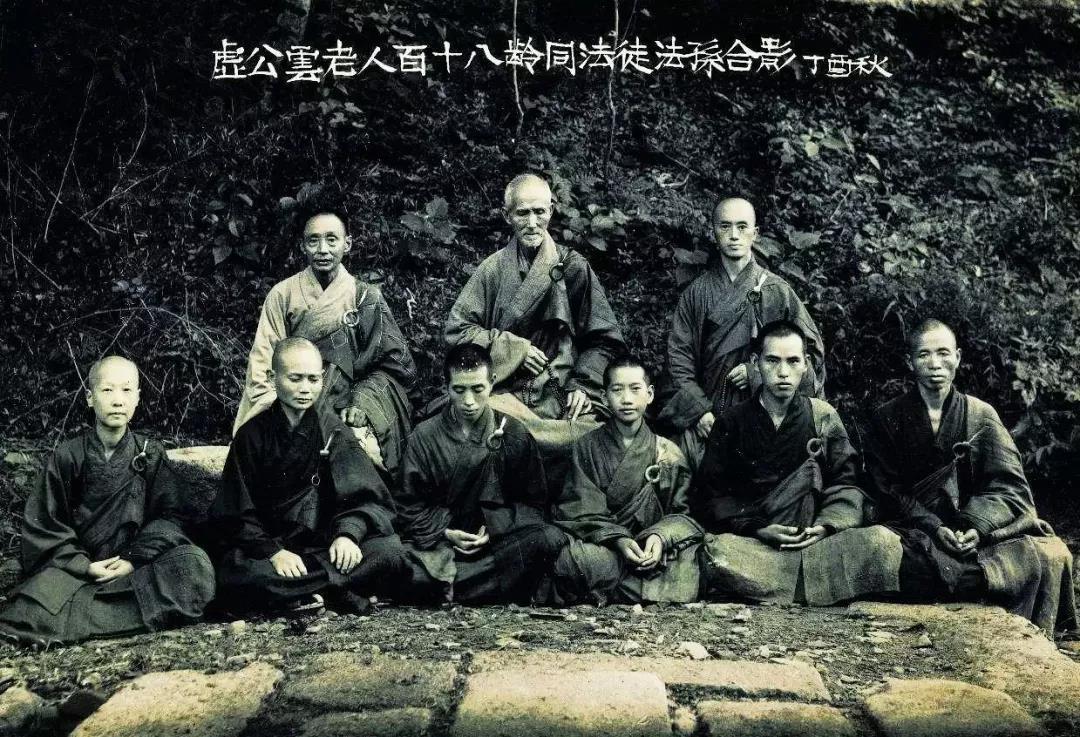
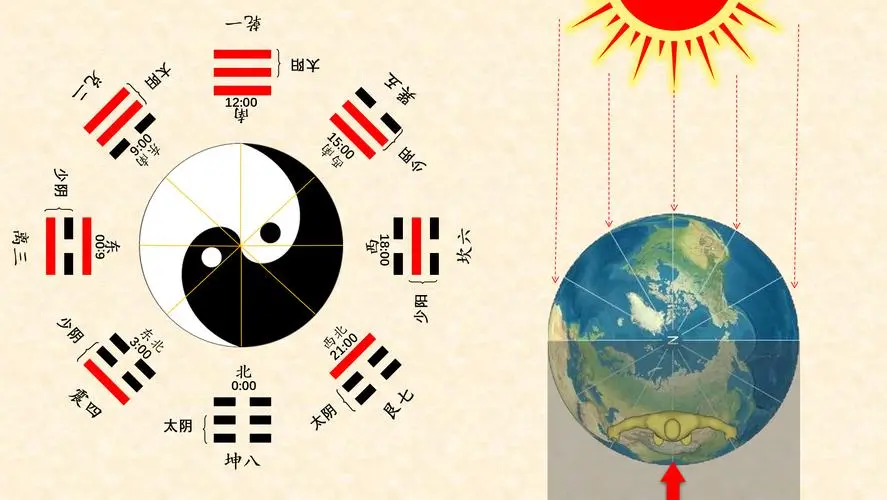
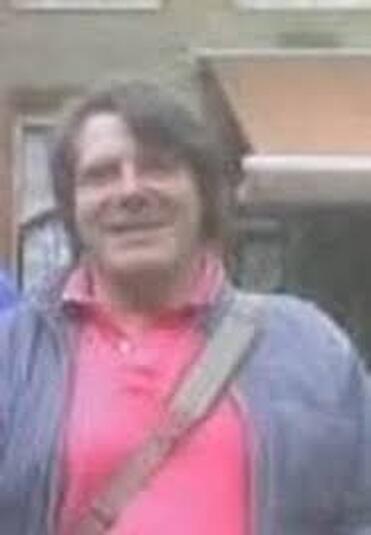
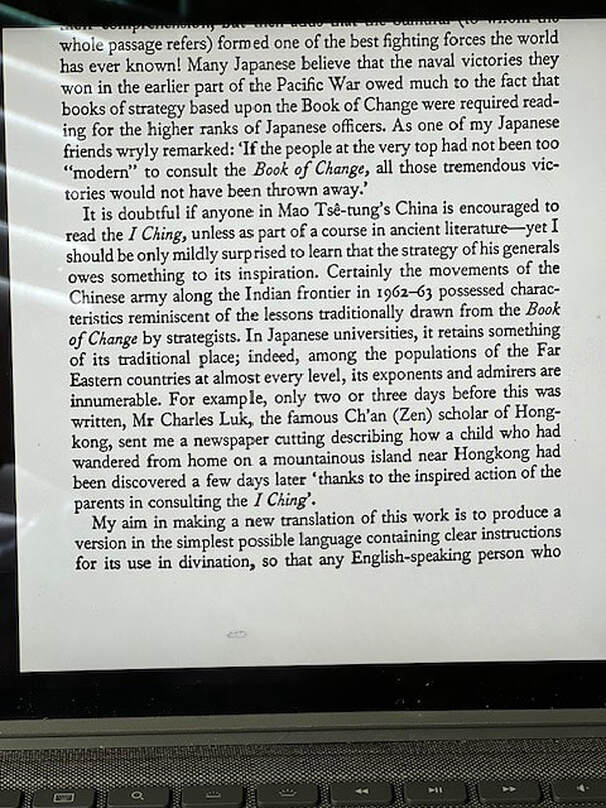
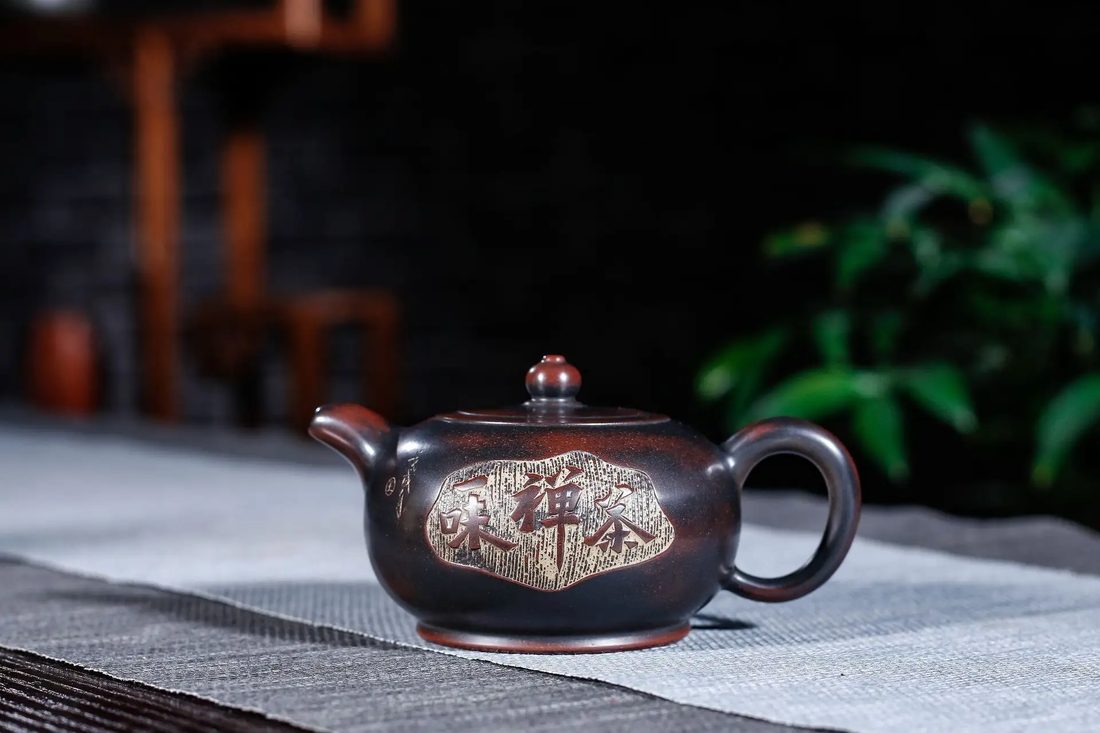
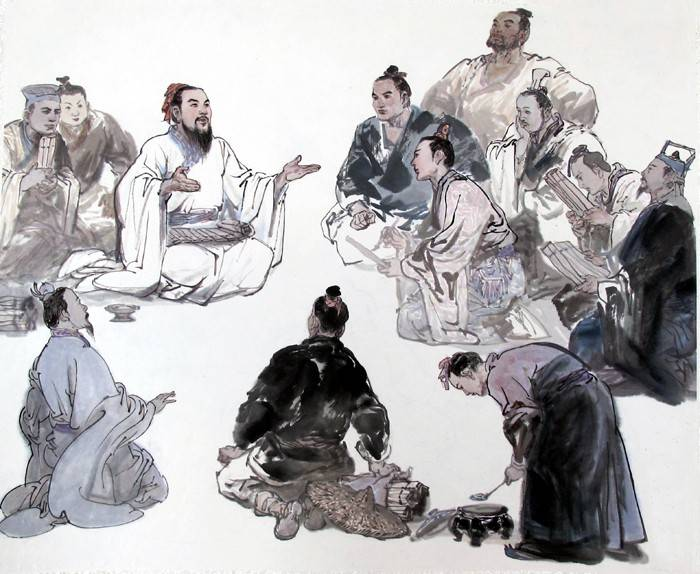
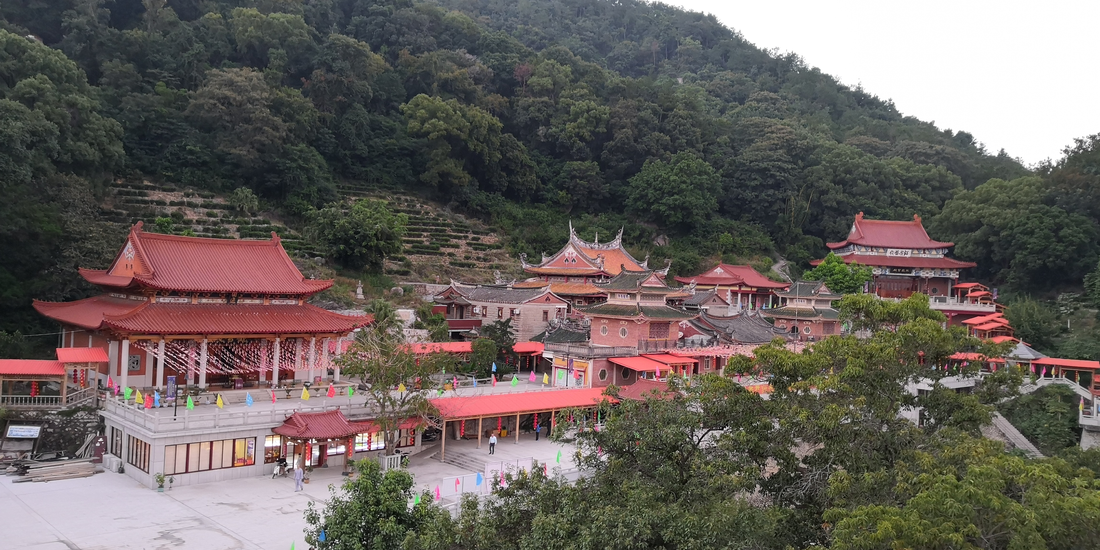
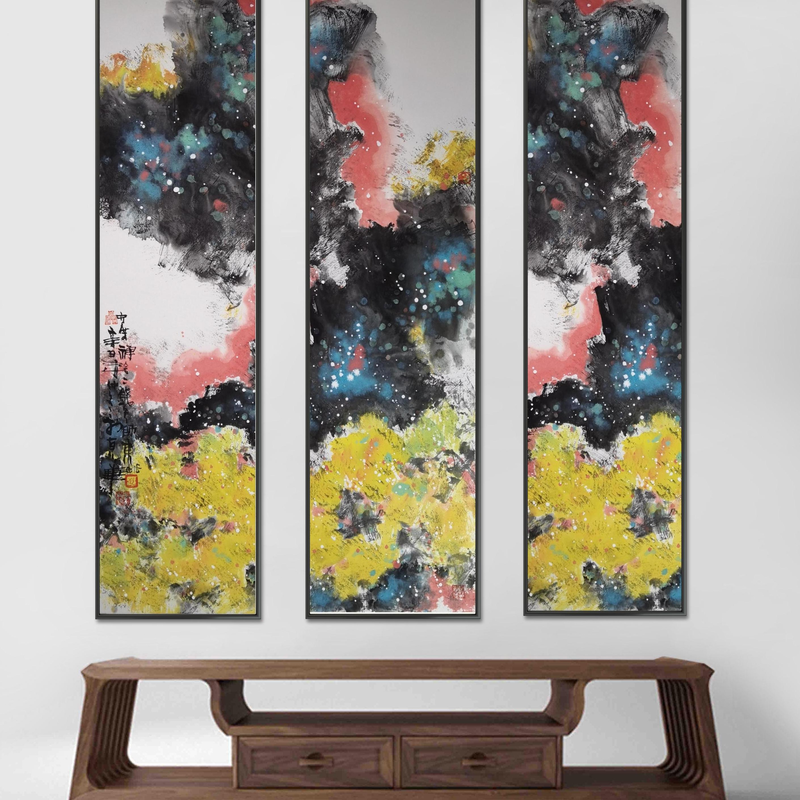
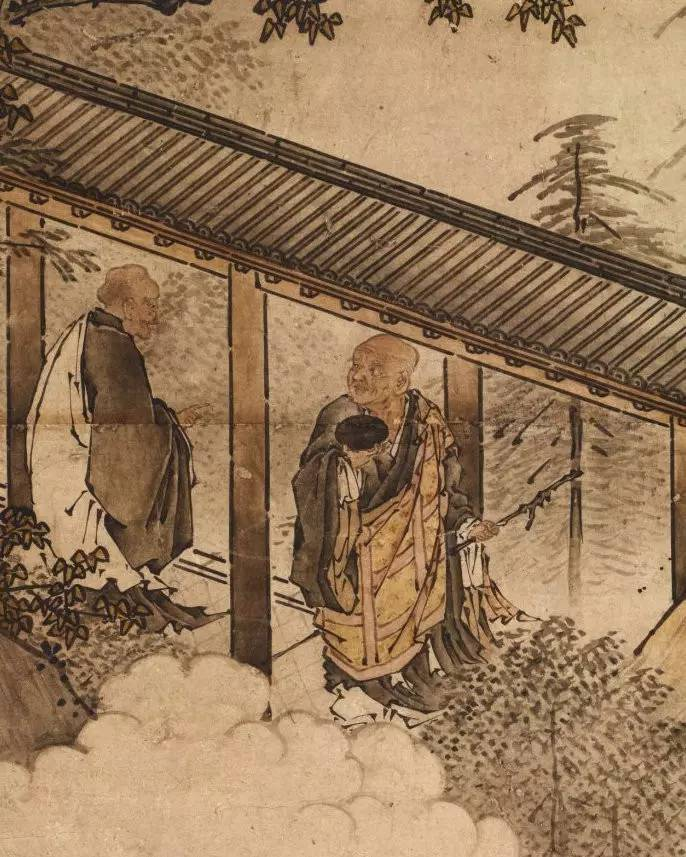
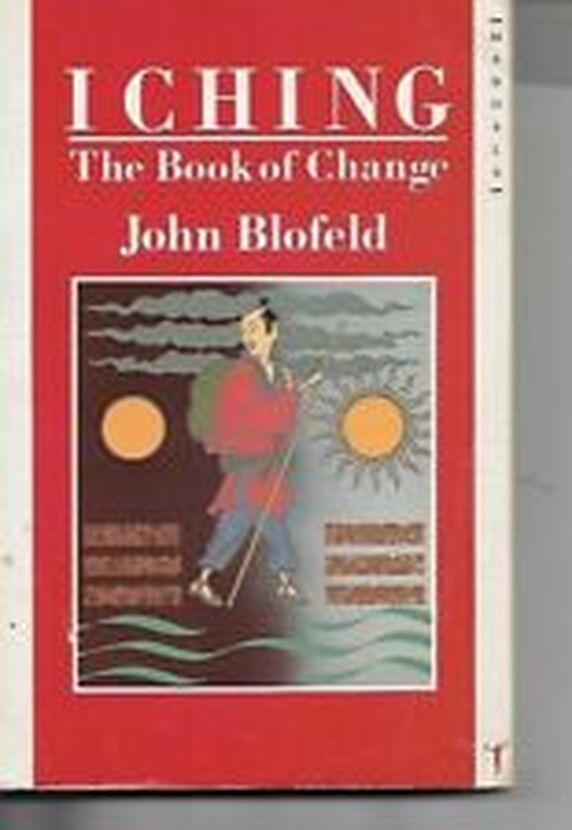
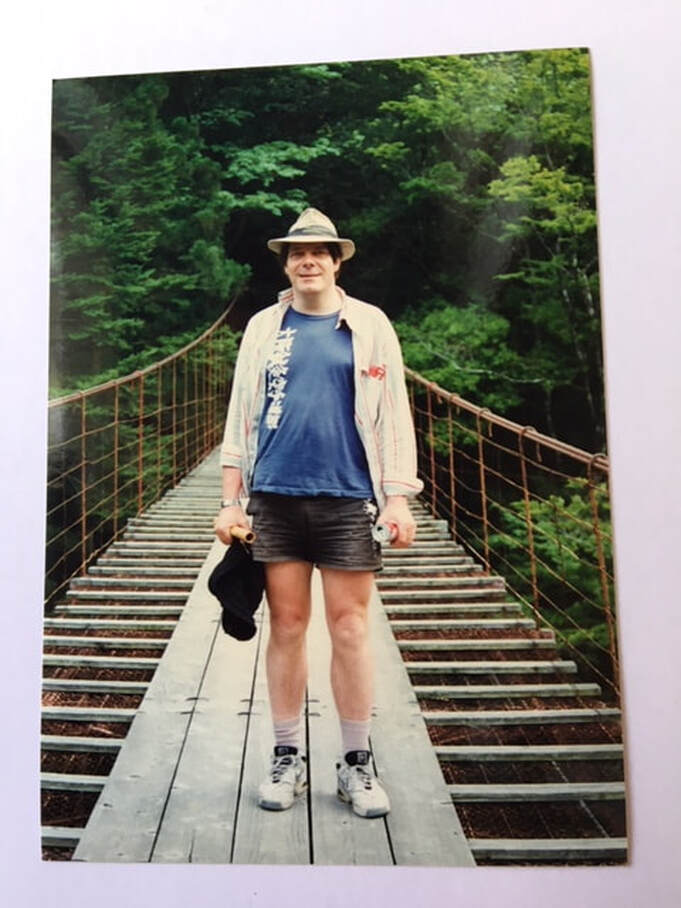
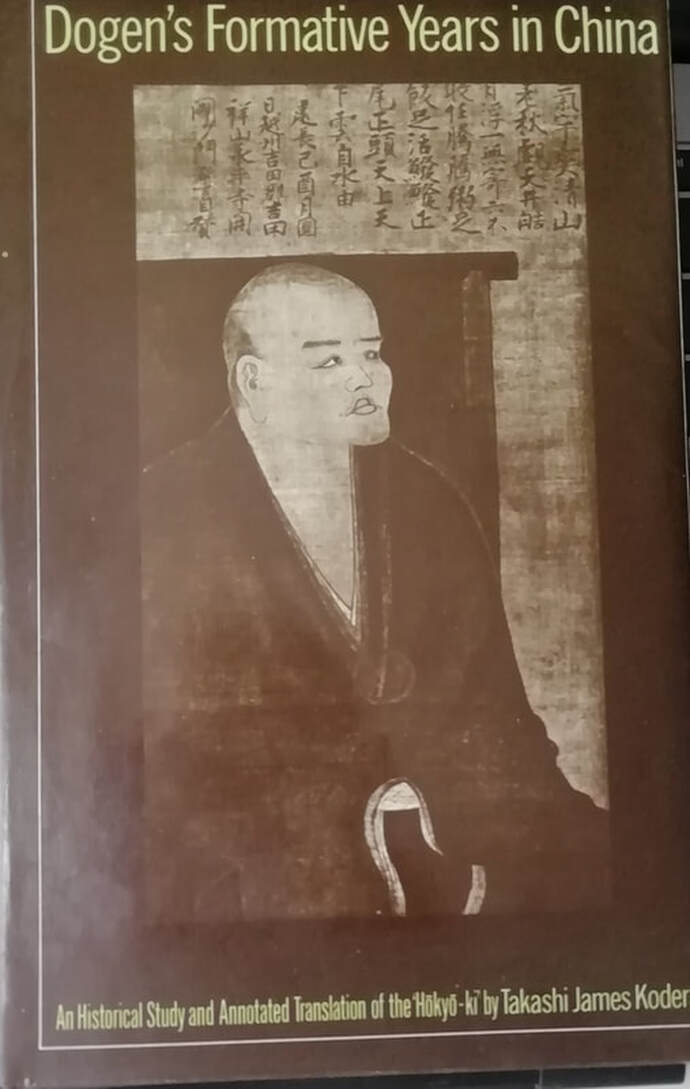
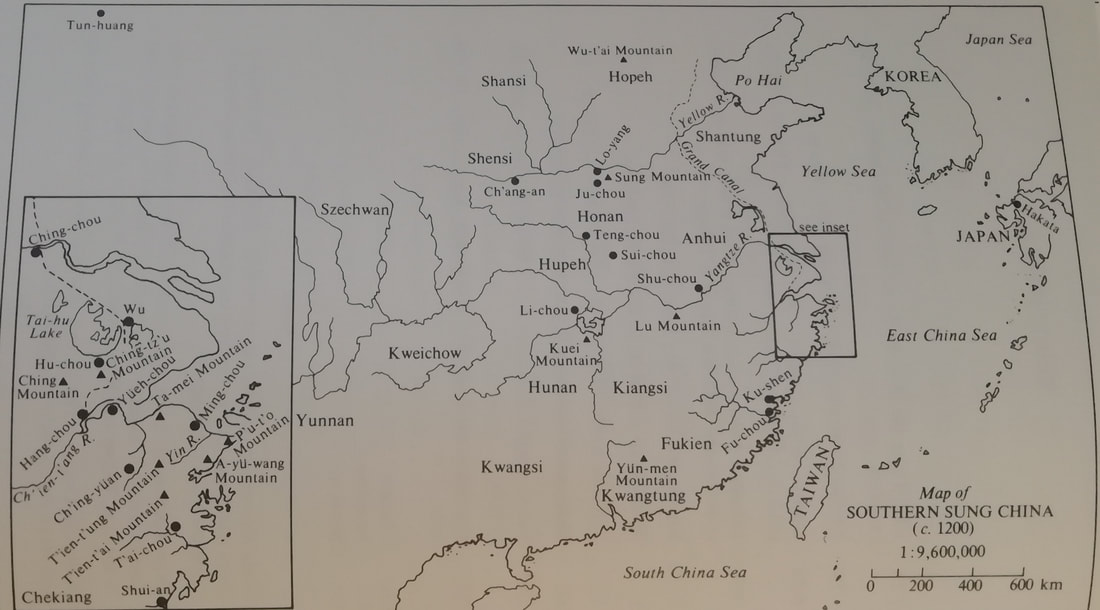
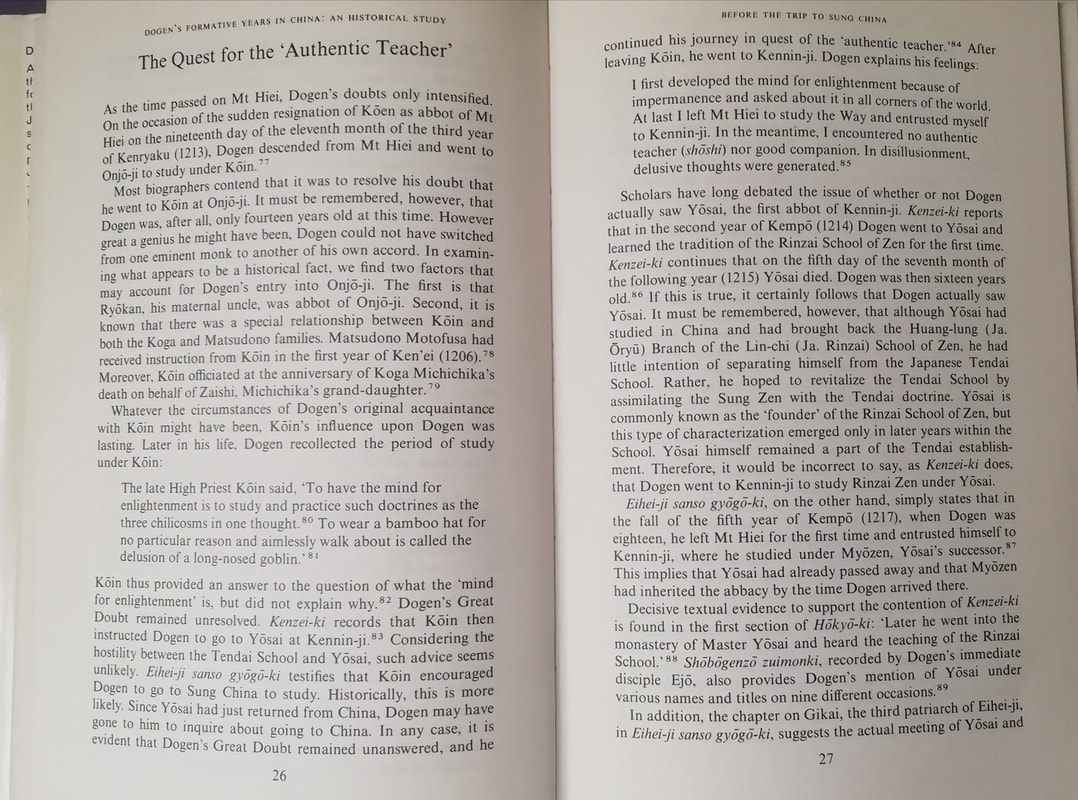
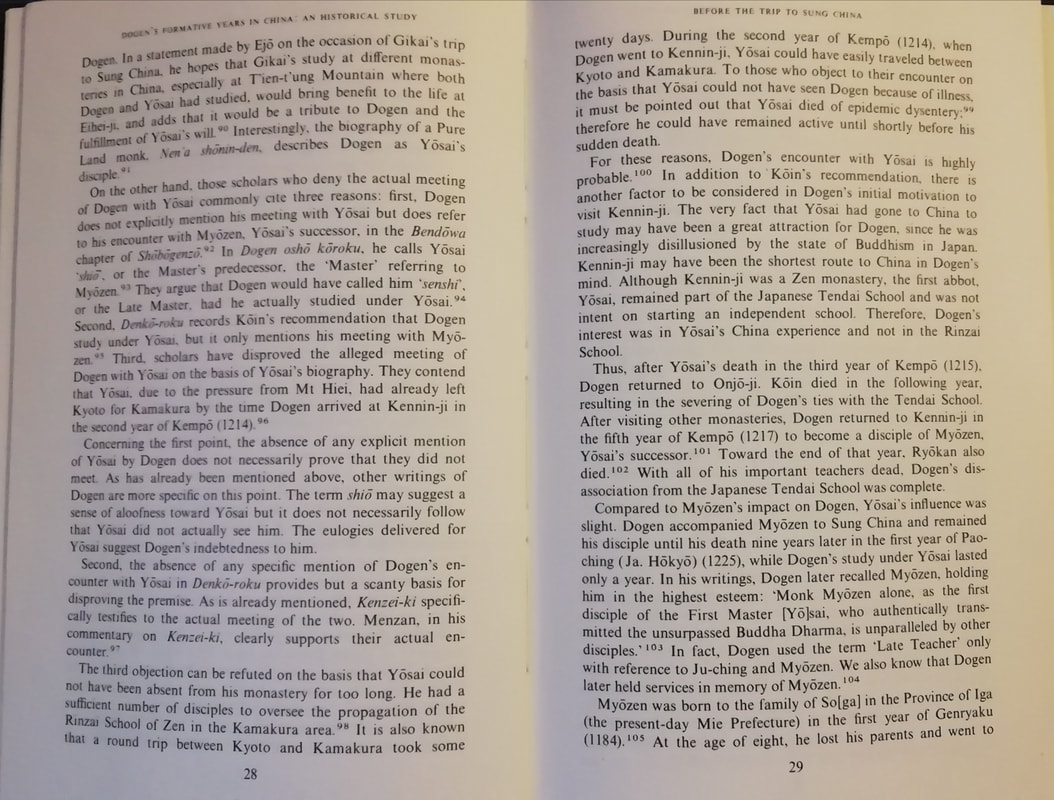
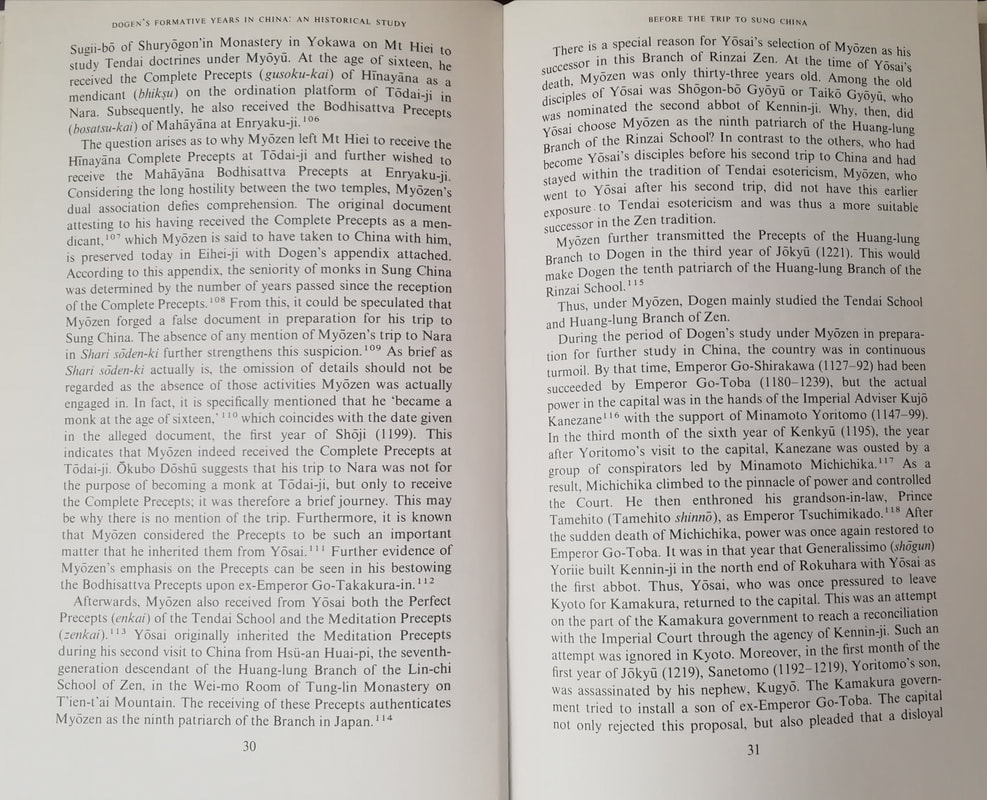
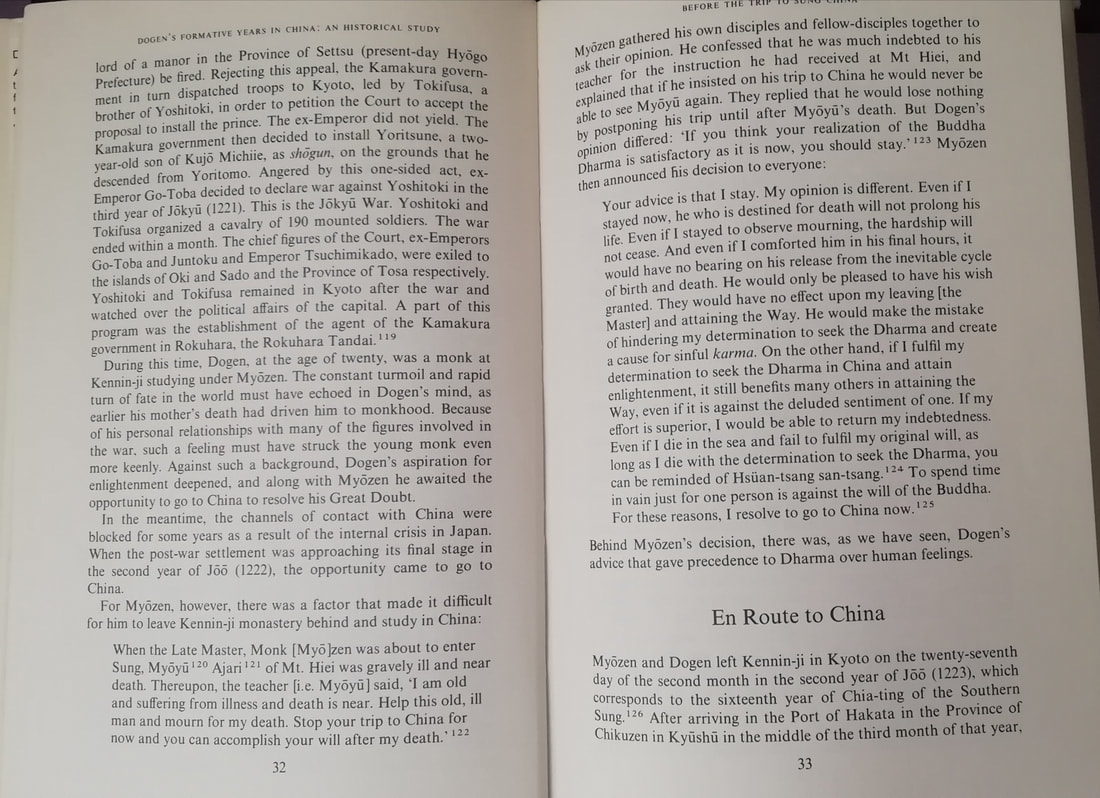
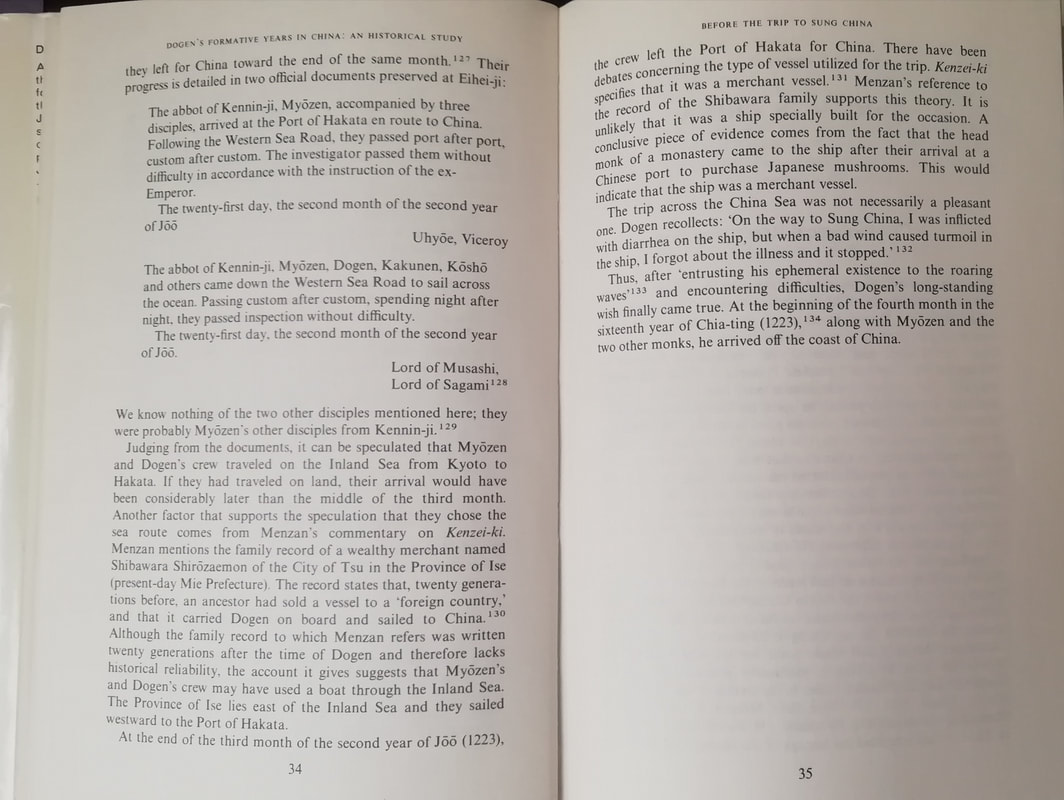
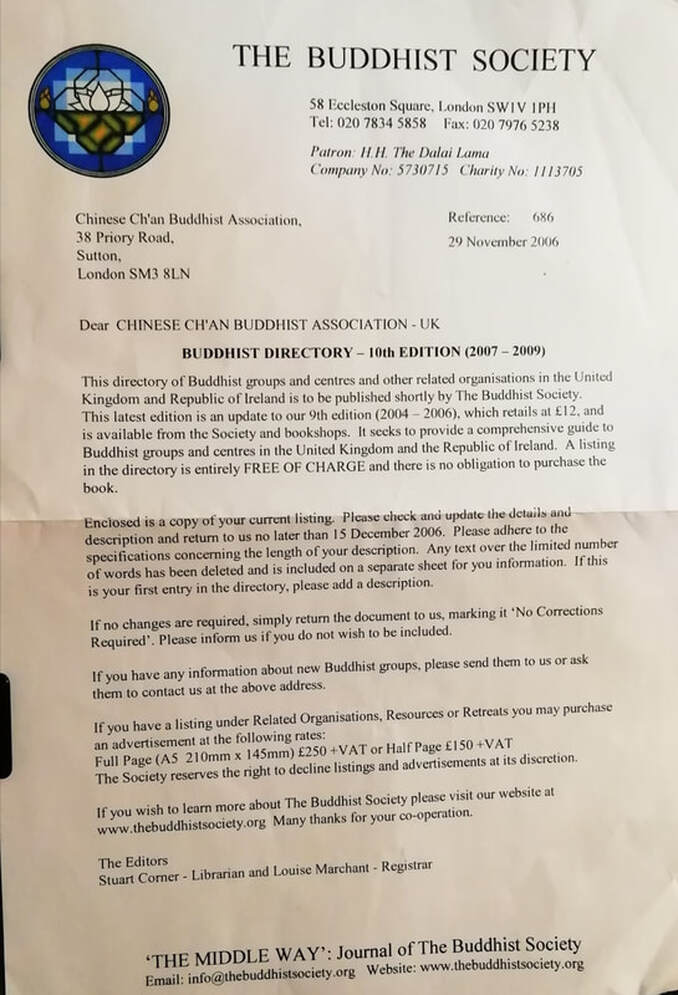
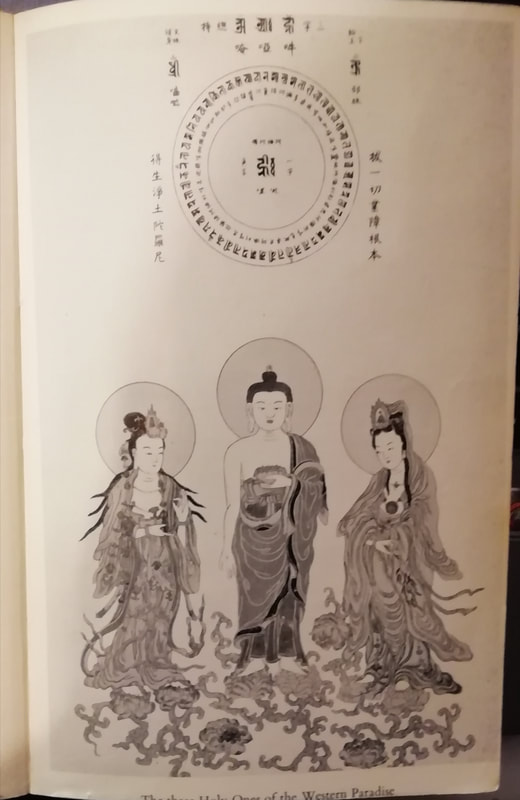
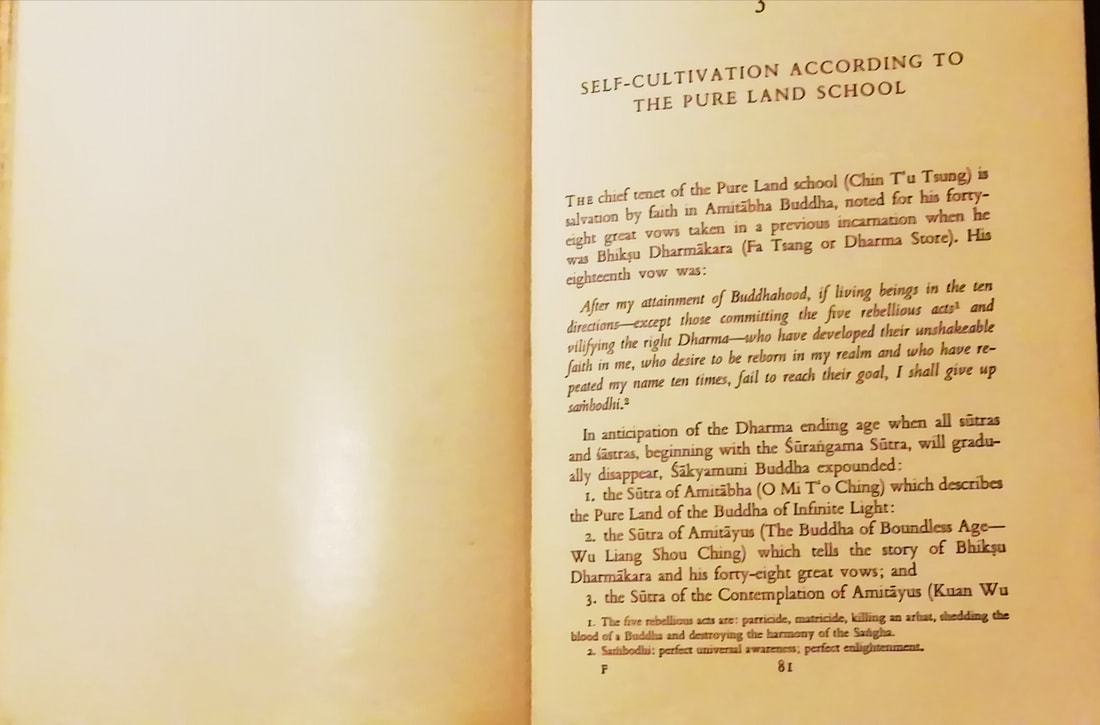
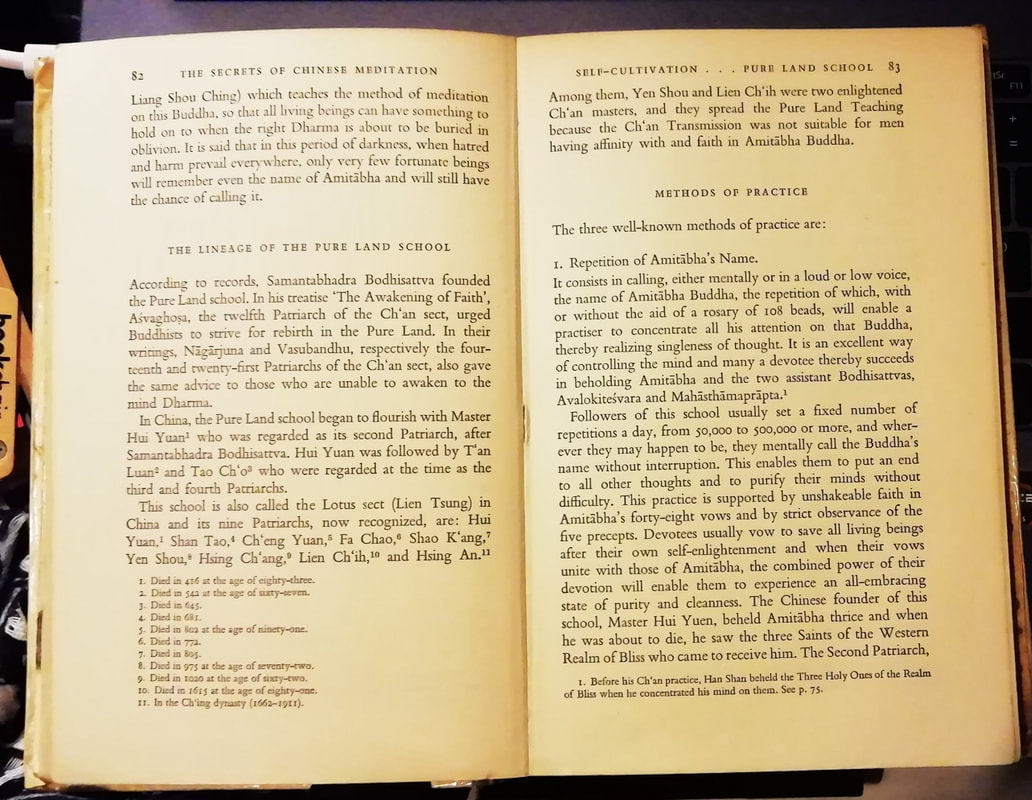
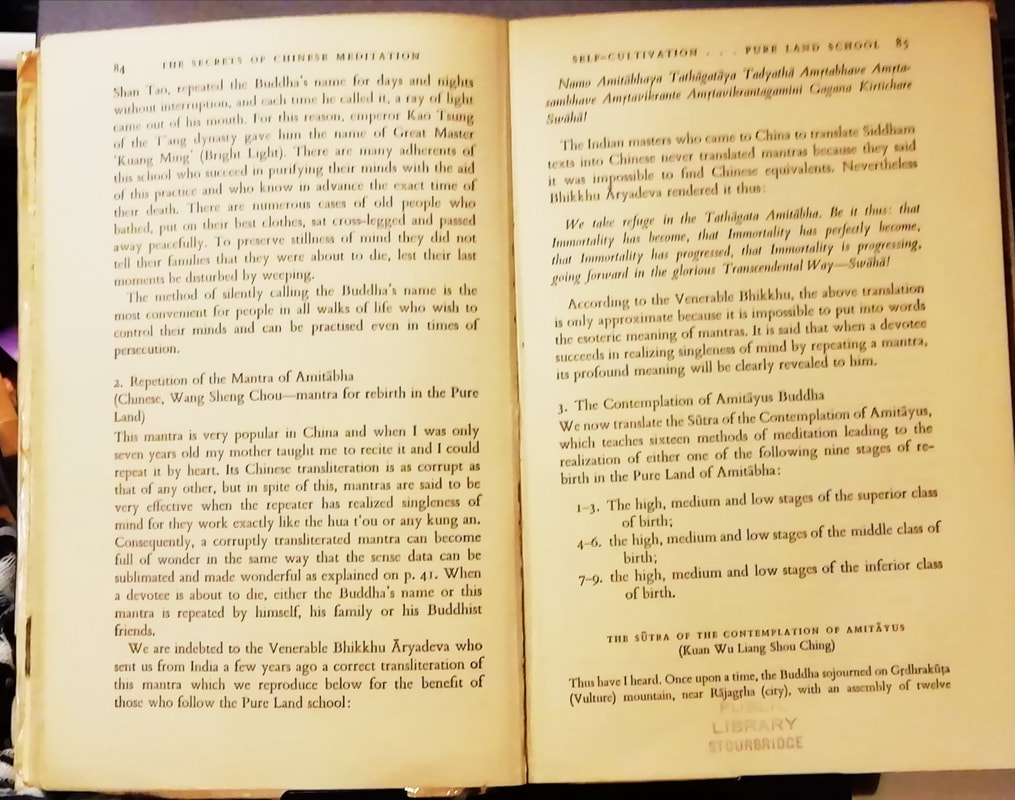
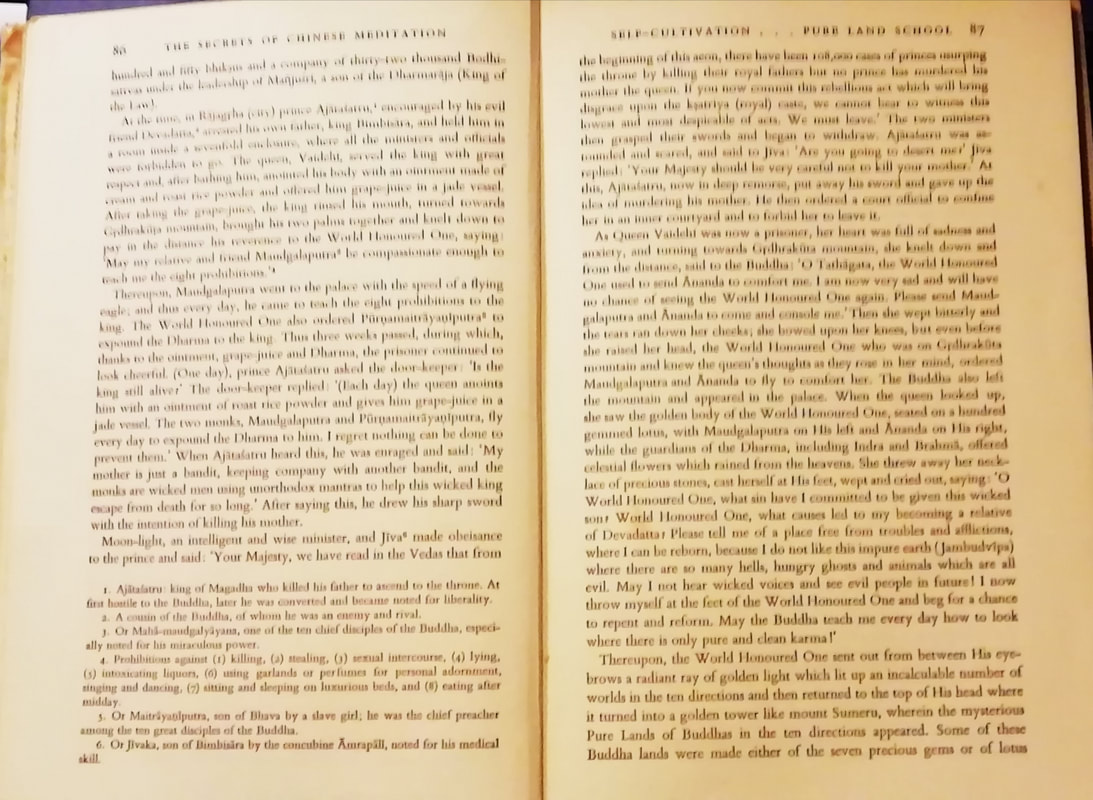
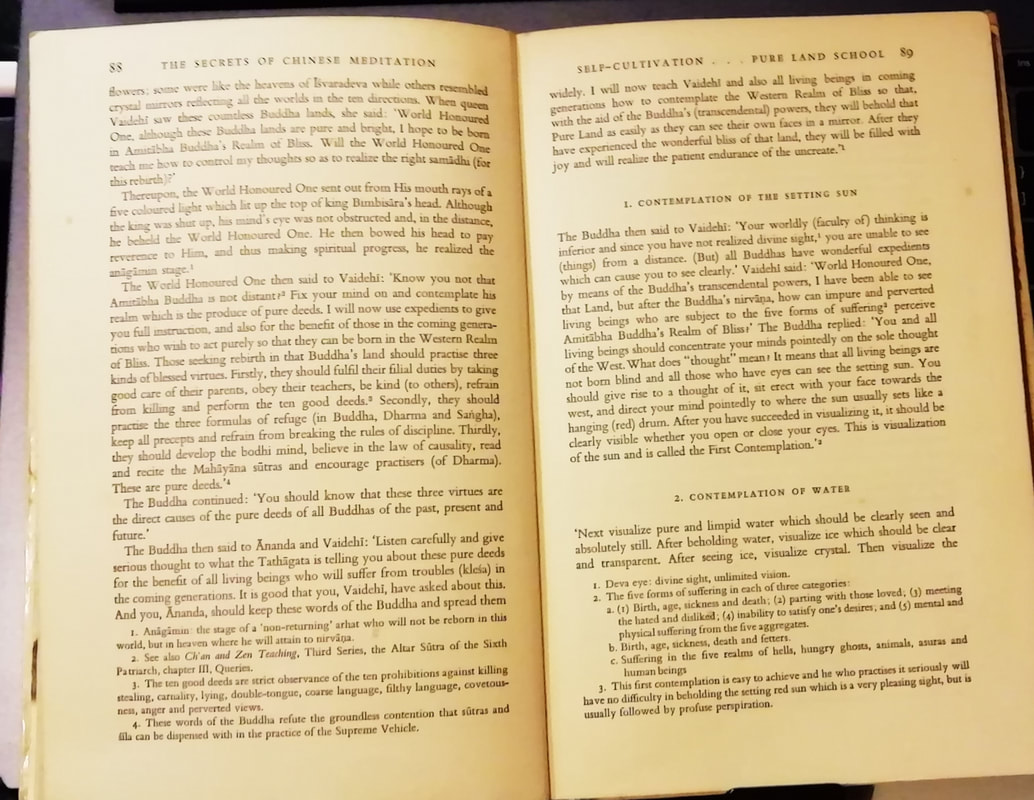
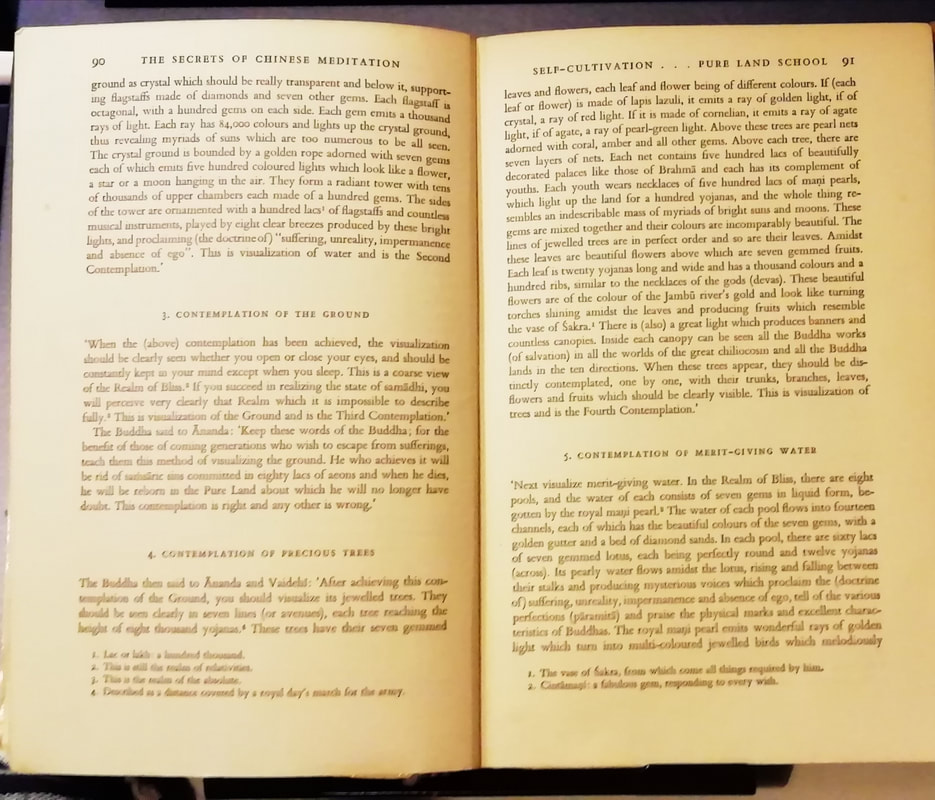
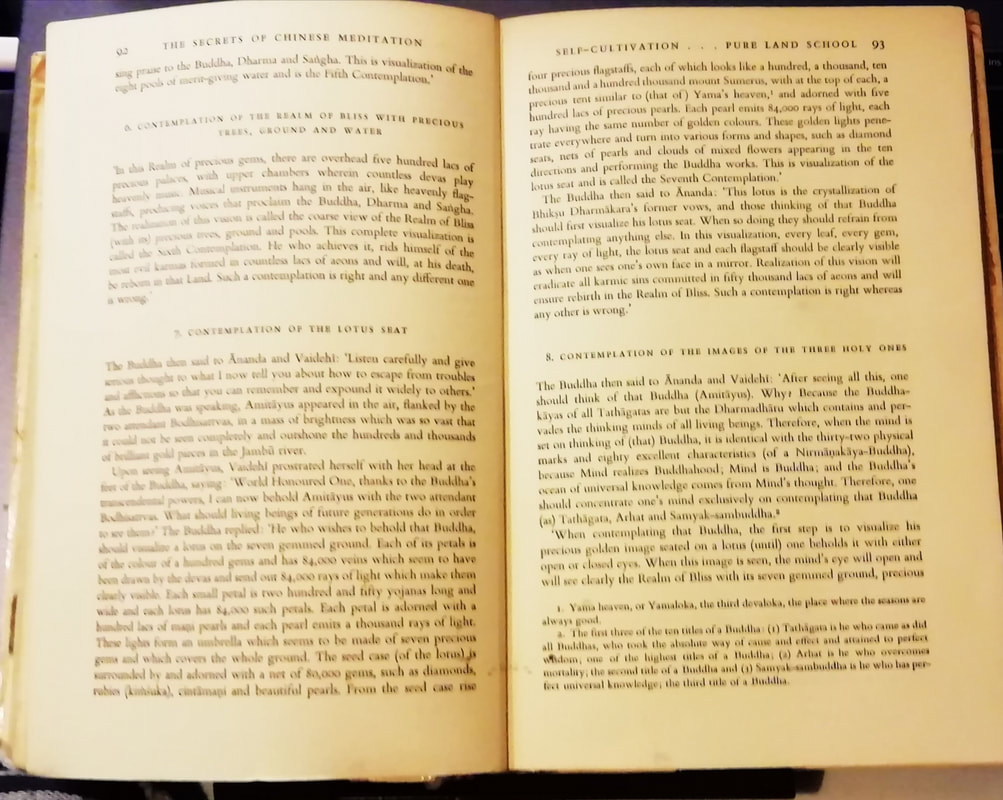
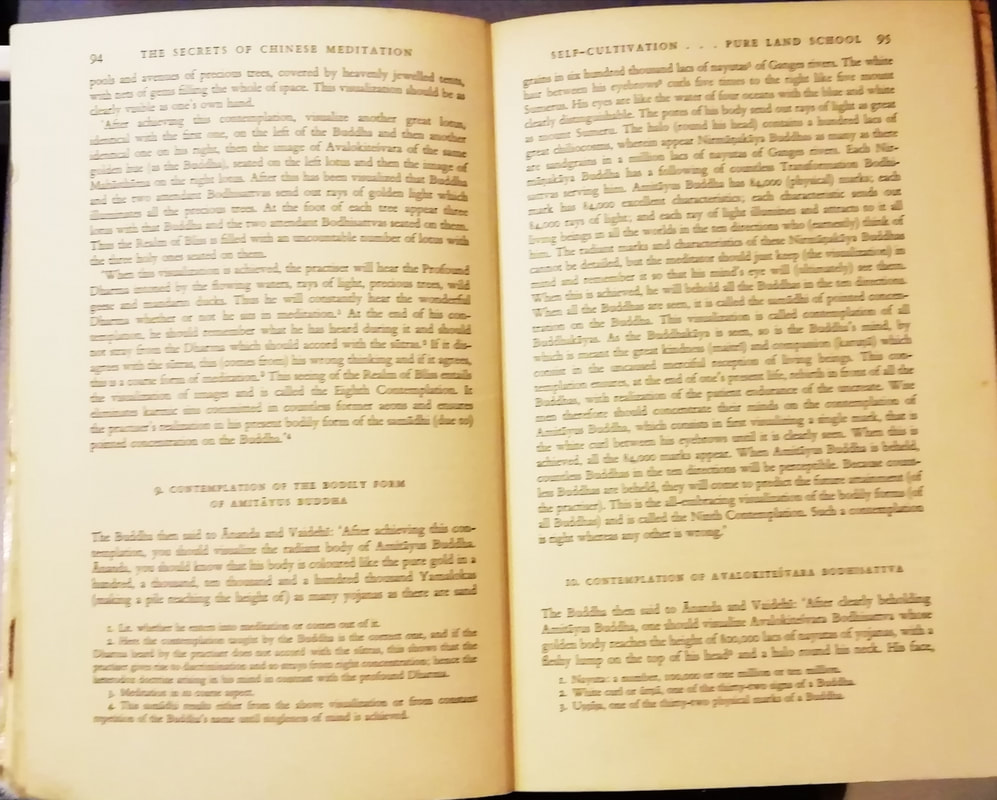
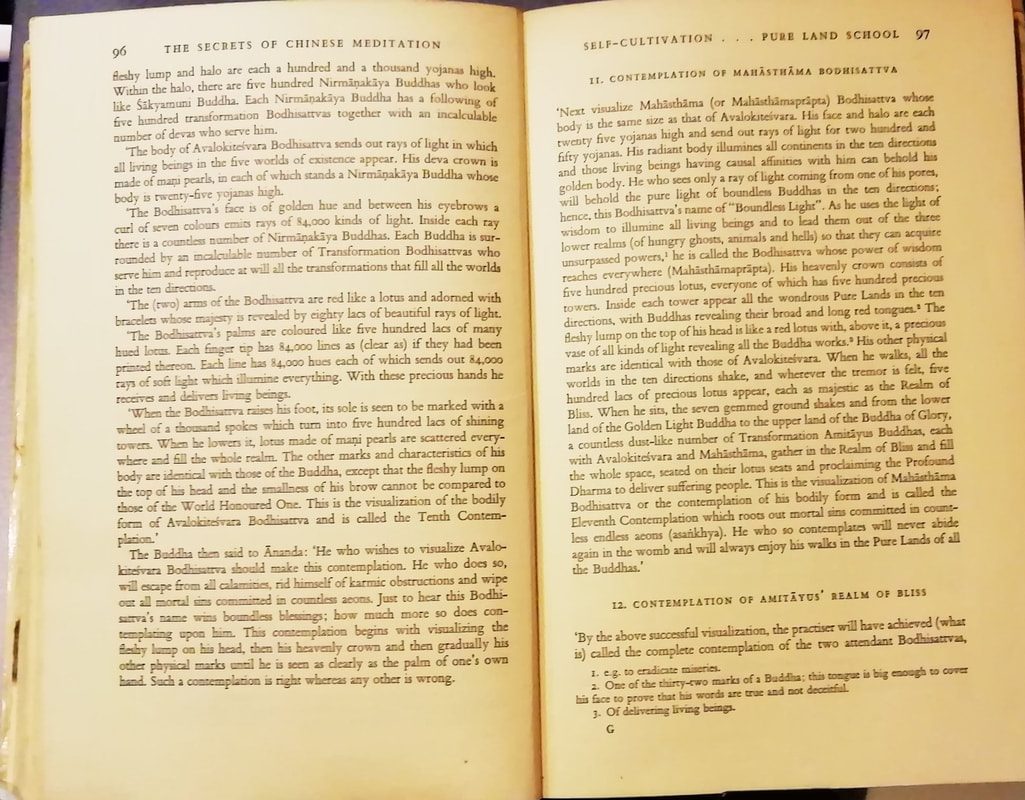
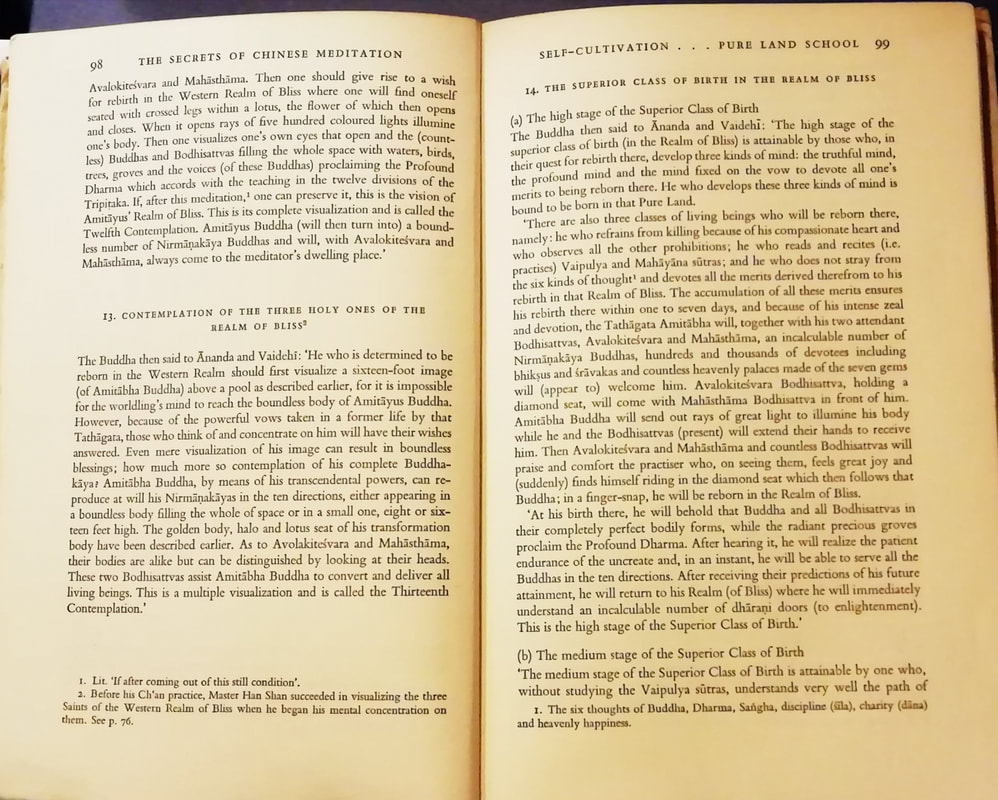
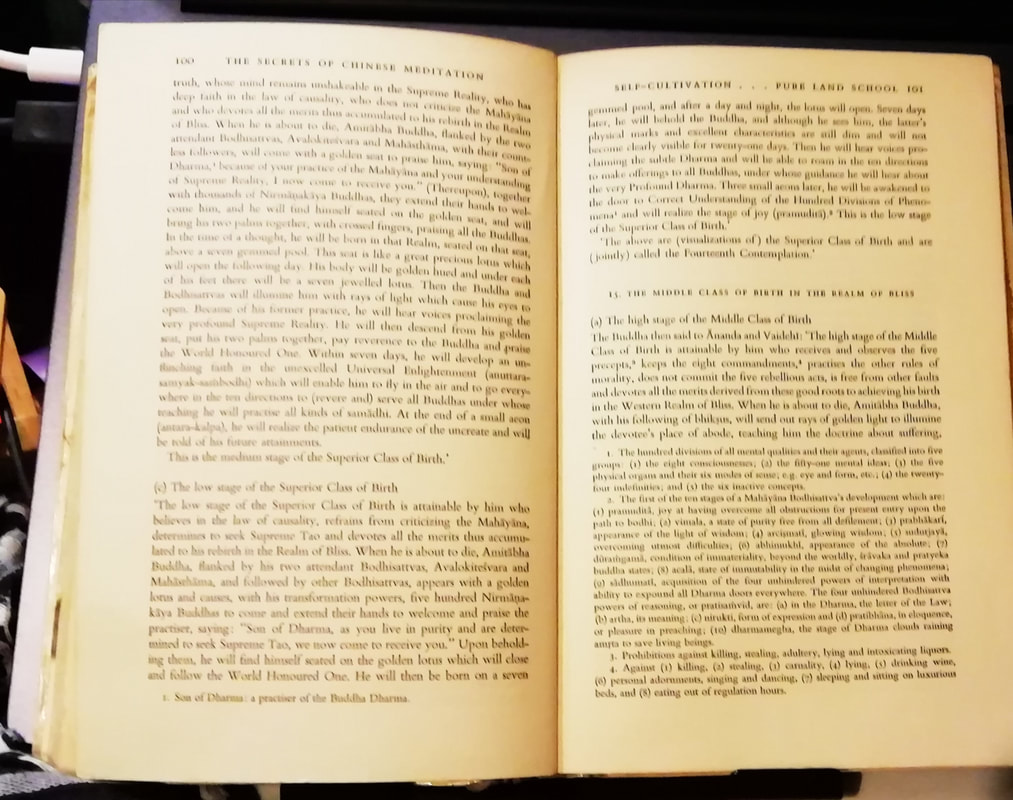
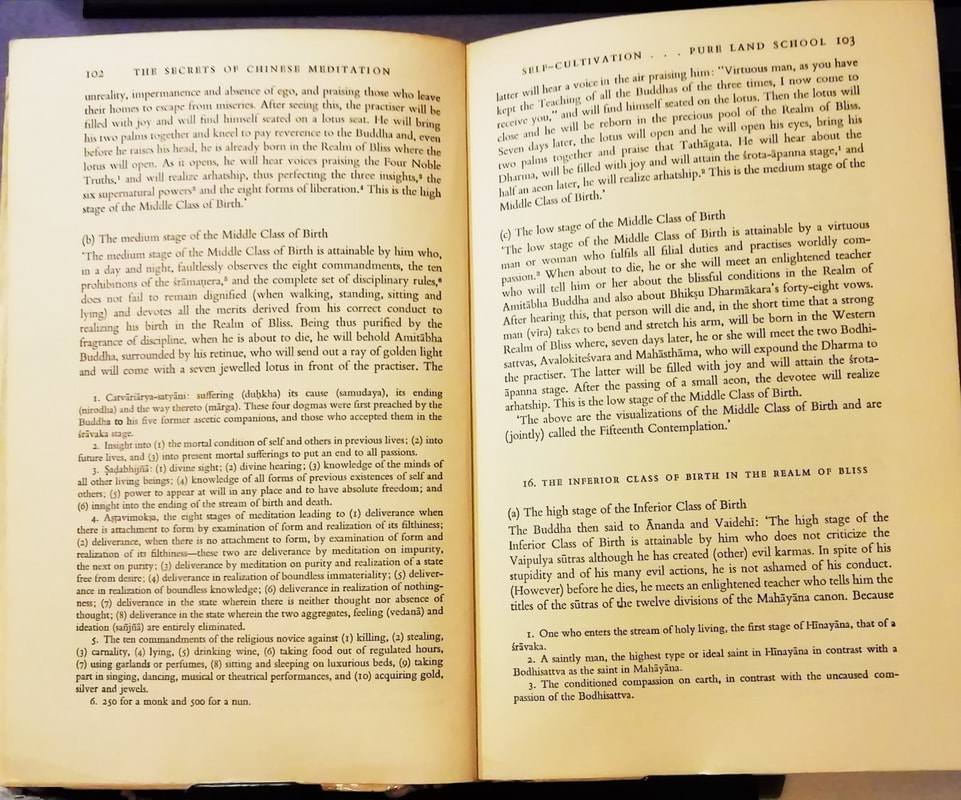
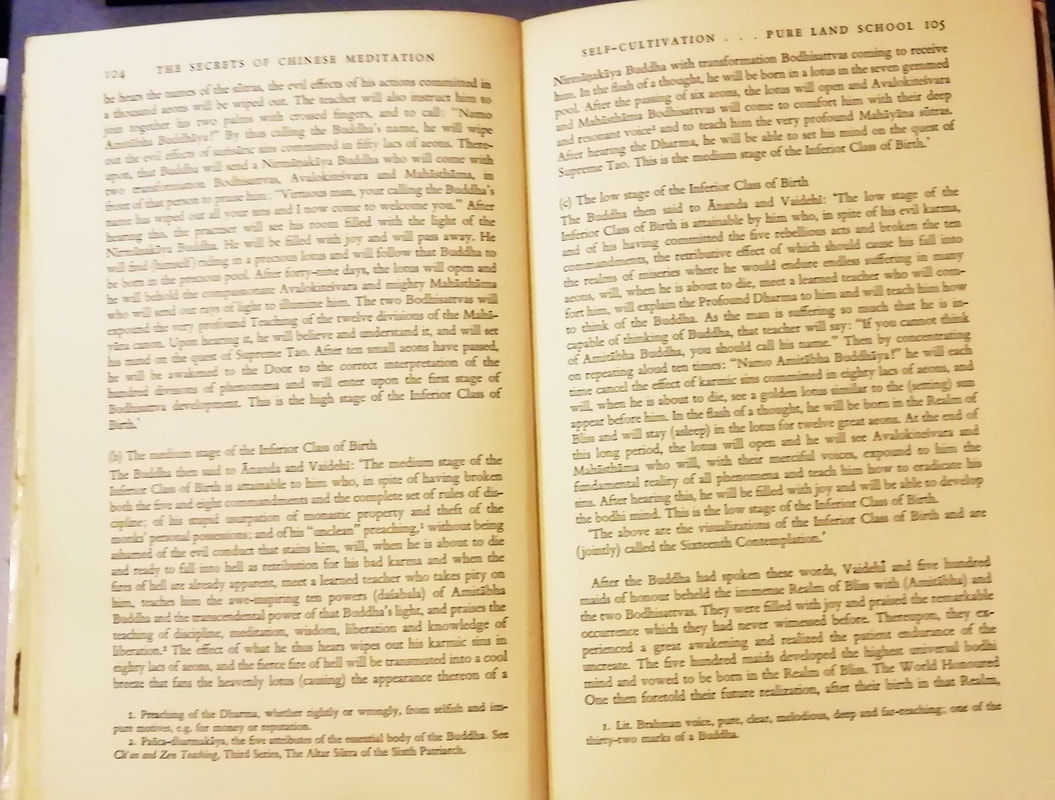
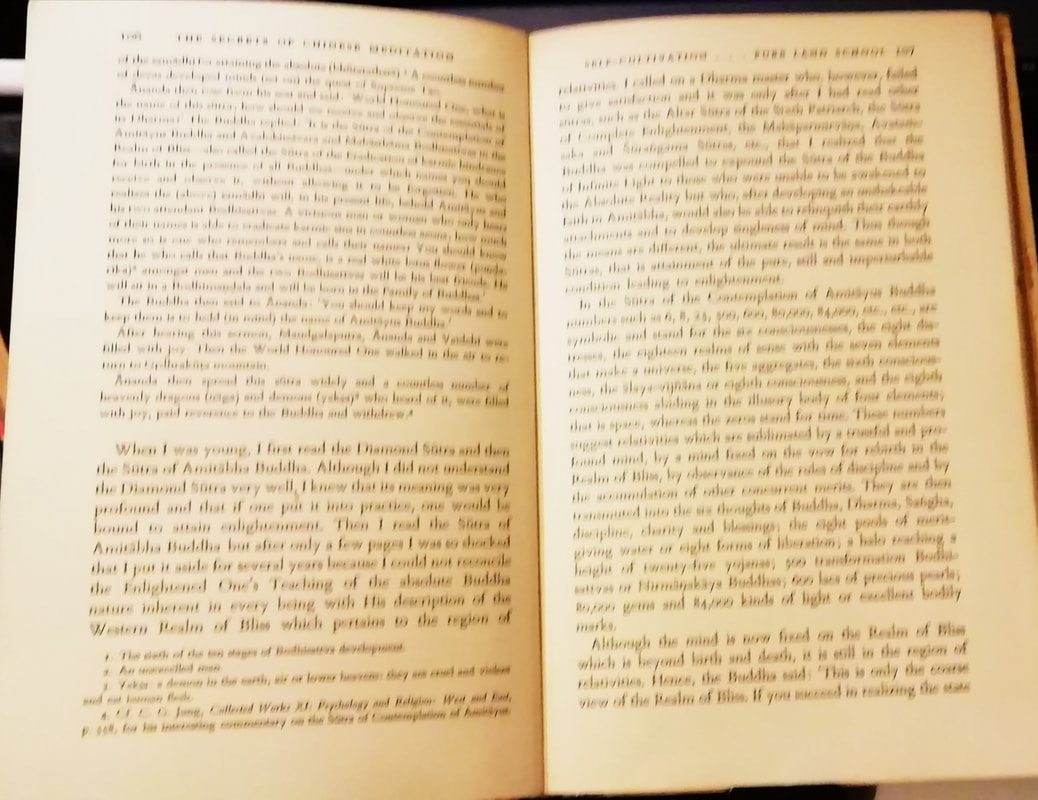
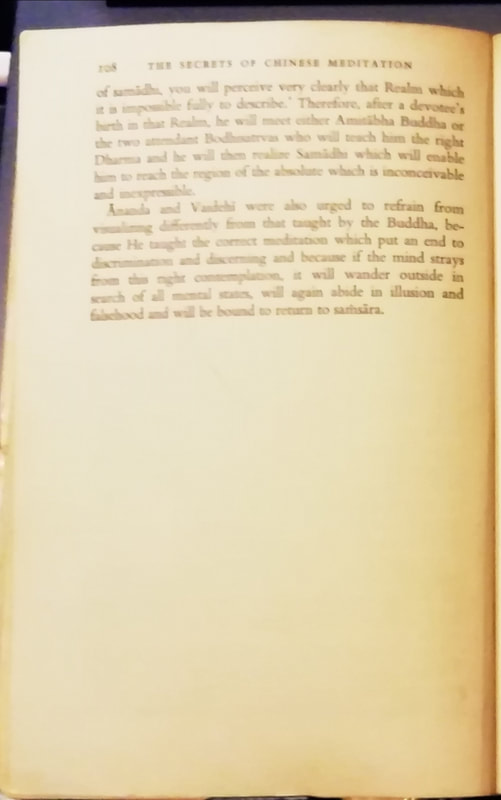
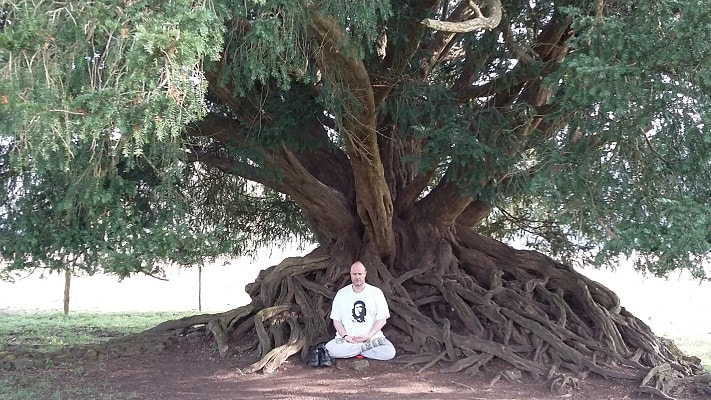
 RSS Feed
RSS Feed